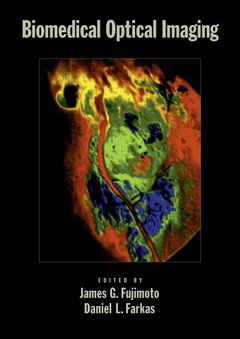Description
Biomedical optical imaging (harback)
Authors: Fujimoto James G., Farkas Daniel
Language: English
Subjects for Biomedical optical imaging (harback):
Approximative price 99.41 €
Subject to availability at the publisher.
Add to cart
Publication date: 04-2009
434 p. · 18.8x26.1 cm · Hardback
434 p. · 18.8x26.1 cm · Hardback
Description
/li>Biography
/li>
Biomedical optical imaging is a rapidly emerging research area with widespread fundamental research and clinical applications. This book gives an overview of biomedical optical imaging with contributions from leading international research groups who have pioneered many of these techniques and applications. A unique research field spanning the microscopic to the macroscopic, biomedical optical imaging allows both structural and functional imaging. Techniques such as confocal and multiphoton microscopy provide cellular level resolution imaging in biological systems. The integration of this technology with exogenous chromophores can selectively enhance contrast for molecular targets as well as supply functional information on processes such as nerve transduction. Novel techniques integrate microscopy with state-of-the-art optics technology, and these include spectral imaging, two photon fluorescence correlation, nonlinear nanoscopy
James G. Fujimoto is Professor of Electrical Engineering and Computer Science at the Massachusetts Institute of Technology, where he works on the development and application of femtosecond laser technology and studies ultrafast phenomena and biomedical optics. He received his bachelors, masters, and doctorate degrees from M.I.T. Daniel Farkas is Vice Chairman for Research in the Department of Surgery and Director of the Minimally Invasive Surgical Technologies Institute at the Cedars-Sinai Medical Center in Los Angeles. He is also a Research Professor in Biomedical Engineering at the University of Southern California, and Adjunct Professor at the Robotics Institute at Carnegie Mellon University. Farkas was trained in theoretical physics in Romania, and holds a Ph.D. in Biophysics and Biochemistry from the Weizmann Institute in Israel.
© 2024 LAVOISIER S.A.S.




